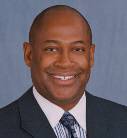Tuesday, May 5, 2009 | 2 a.m.

Morse Arberry
Sun Archives
Sun Topics
In his lawsuit against Countrywide Home Loans, Las Vegas Assemblyman Morse Arberry portrays himself as naive to the cutthroat ways of the mortgage business.
He alleges that the lending giant, now operating under the name of Bank of America Home Loans, deceived him into taking out loans for two rental properties, knowing that the value of the properties would sharply decline in the dicey real estate market months later and send him into foreclosure. The homes, in Las Vegas and North Las Vegas, cost him $230,000 and $255,00 in August 2006, but are unlikely to be worth that much today.
Arberry disputes that he is behind in payments on the two properties. He says he tried with no success to get the company to talk to him before it started foreclosure proceedings.
His experience, he explains, is like what many other Nevadans have encountered during the lending crisis.
That is probably true.
But several aspects set Arberry apart from others caught in the real estate crunch.
He is not a novice in the world of finances and real estate. He has been in the mortgage business himself since 2000, and since 1997 he has been chairman of the Assembly’s Ways and Means Committee, which oversees the state’s $6 billion budget and wields influence over the way mortgage lenders and other businesses operate in Nevada.
The Clark County assessor’s online records show that Arberry has acquired seven properties in the valley since the late 1990s, including a 6,279-square-foot home he co-owns in the Canyon Gate Country Club.
Brock Davis, former president of the Southern Nevada Chapter of the Mortgage Brokers Association, says anyone in the business is held to a higher standard when seeking a loan.
“They assume we know more than laypeople,” he says. “They make us qualify more strictly.”
Davis says it looks as though Arberry and his lawyer, George Kelesis, filed the suit to get Bank of America’s attention.
That’s exactly what it did.
Despite having suspicions about his claims, Bank of America moved quickly to try to resolve the case and give Arberry what he wanted — a loan modification on the two rental homes. Negotiations began the day after the suit was filed, raising a new set of questions about Arberry’s real estate dealings.
Obtaining a loan modification on an investment property, it turns out, is not very common.
Rick Simon, communications manager for Bank of America in Calabasas, Calif., says it is more difficult for a lender to justify that kind of a deal.
“The programs out there are designed to keep people in their primary residences,” he says. “People investing in rental properties are considered to have made the investment with the knowledge that there could be something that could make that investment not pay off.”
Yet Bank of America is now doing its best to accommodate the chairman of the powerful Ways and Means Committee. On April 27, the same day Arberry filed his suit in Las Vegas, Arberry’s Ways and Means Committee passed a bill in Carson City that requires lenders to try to work out loan modifications for people whose homes are on the verge of foreclosure.
Simon says he can’t discuss Arberry’s dealings with his company because of privacy laws, but he insists that putting off the foreclosure is standard procedure when litigation occurs.
Foreclosure is an expensive process and lenders always consider it a last resort, he explains.
Arberry, he adds, is not getting any special treatment.
Less politically important Nevadans in similar positions, however, might not share that opinion.

Join the Discussion:
Check this out for a full explanation of our conversion to the LiveFyre commenting system and instructions on how to sign up for an account.
Full comments policy